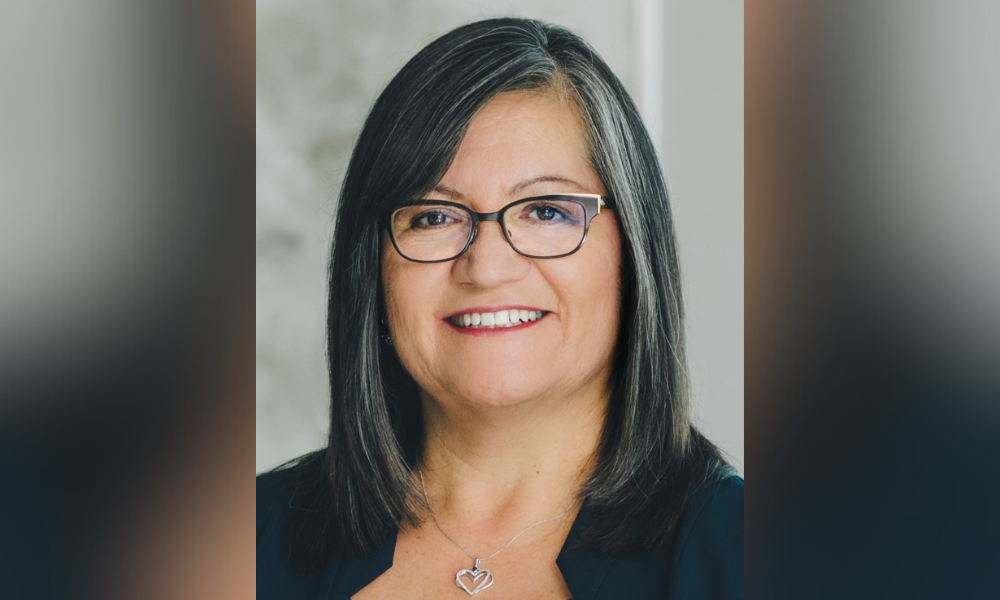
Aird & Berlis recently announced a new Indigenous law student scholarship in Thomas' honour

Kimberly Thomas’ parents and grandparents instilled in her the idea that everyone is given a gift, and it was her responsibility to find a way to use her gift to help her people.
A citizen of the Seneca Nation of the Bear Clan, Thomas grew up in Six Nations of the Grand River Territory in Southern Ontario.
Initially, she believed social work would provide the path to fulfilling that responsibility. While interested in law, she did not see herself as a lawyer.
“Social work, as an Indigenous woman, felt more like a socially acceptable career choice, quite frankly,” she says.
Her work focused primarily on helping families of clients who were addicted to various substances. After spending four years in the field and moving into more senior administrative roles, she built the confidence to apply to law school “and see what happened.”
Her social work experience had also politicized her, and she thought the law would allow her to promote change on a broader level. Her work demonstrated the impact of colonization and intergenerational trauma. It revealed aspects of the relationship between Canada and Indigenous peoples she had not learned about in her post-secondary degrees or the Indian Day School she attended as a child.
“I was seeing the issues that my clients were struggling with as individuals, families, and communities were actually part of a much larger picture, which is traceable back to colonization and attempted genocide of Indigenous people in Canada,” says Thomas. “And there was just no doubt about that.”
She chose the University of British Columbia because it had the most available courses in Aboriginal law. UBC also had an exchange program through which she spent a semester at Arizona State University, learning about Aboriginal law in the US context.
Graduating in 1996, she spent five years at Aird & Berlis before launching her own law firm, Kimberly Thomas Professional Corporation. Her original intention was to be a litigator and advance cases under s. 35 of the Charter, which states: “existing aboriginal and treaty rights of the aboriginal peoples of Canada are hereby recognized and affirmed.” But she found she was more suited to corporate/commercial work. After five years of juggling both a litigation and corporate practice, she chose to concentrate exclusively on the latter.
Thomas says her work for a corporate lawyer during the summer following her second year in law school helped her realize the potential of corporate/commercial legal practice to advance the interests of Indigenous people.
“I just thought, ‘Well, it's just capitalism.’ But he helped me to see that it's not just capitalism; you can actually create an economy and wealth that can improve the quality of life for a whole community, a whole nation.”
Thomas’ firm advises Indigenous Nations and Indigenous-owned organizations. She also holds the role of affiliated independent counsel and co-lead of the Indigenous Group at Aird & Berlis. Part of her job is working with nations on economic development projects to increase what she calls “own-source revenue” – the nation’s revenue outside of Indigenous Services Canada funding, which is necessary for the nation’s infrastructure, education, housing, and social services. She also advises private entrepreneurs and non-profits.
Among Thomas’ clients, she says there is an overwhelming desire for more control over governance.
“The Indian Act system has been imposed on them,” she says. “There are very limited options in terms of self-government. The federal government has a very specific process you're supposed to follow if you want to negotiate a self-government agreement, and that process just is not necessarily compatible with a lot of Indigenous worldviews and value systems or governing systems that they subscribe to.”
In addition to governance issues, she says her clients also deal with “the ongoing effects of colonization and genocide,” which include a lack of clean drinking water, high suicide and addiction rates, and intergenerational trauma.
In working with Indigenous people, Thomas’ goal is to use the tools of the Canadian legal system to help her clients “overcome colonization and oppression.”
“How do I improve the quality of life? How do I address colonization in a manner that empowers the client?... How do we push Canadian laws and policies in a way that allows us to bring forth our truth and our laws, so that those are respected?”
Thomas says the best way for Canada to reconcile with Indigenous peoples is to “breathe life into UNDRIP,” the United Nations Declaration on the Rights of Indigenous Peoples. She says that Canada must examine UNDRIP’s principles, recognize that Indigenous nations in Canada differ in goals, and consider how two nations can have sovereignty on the same land base in a modern-day context.
“That is going to be a monumental task… Not impossible, but there has to be the political will on the part of Canada and Indigenous people.”
Aird & Berlis recently announced the introduction of a new law school student scholarship in Thomas’ honour. The scholarship will go to an Indigenous law student and provide $10,000 annually for up to three years.